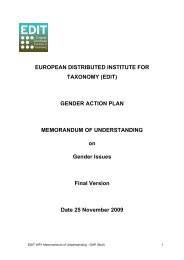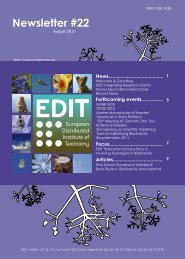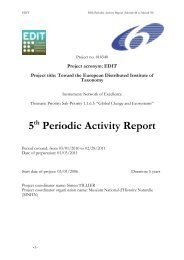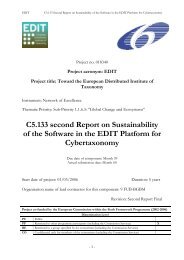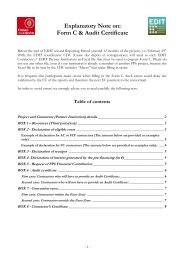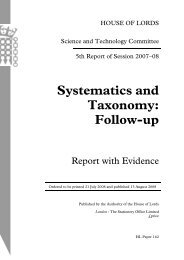Newsletter #5 - EDIT | - European Distributed Institute of Taxonomy
Newsletter #5 - EDIT | - European Distributed Institute of Taxonomy
Newsletter #5 - EDIT | - European Distributed Institute of Taxonomy
Create successful ePaper yourself
Turn your PDF publications into a flip-book with our unique Google optimized e-Paper software.
http://www.bionet-intl.org<br />
Kornelia Rassmann & Richard Smith<br />
Responding to end-users <strong>of</strong> taxonomy in less industrialised countries<br />
Humankind depends on Nature’s services for their well-being, socio-economic<br />
development, and potentially even survival. To understand, quantify, map and sustainably<br />
use natural resources we need «<strong>Taxonomy</strong>» – the science and process <strong>of</strong> discovery,<br />
naming and classification <strong>of</strong> all living things. Without taxonomic know-how, how can we<br />
tackle our health, food and environmental needs How can environment agencies identify<br />
and combat harmful invasive species, farmers control agricultural pests, pharmaceutical<br />
researchers discover new drugs, medical science identify diseases and developing<br />
countries benefit from their biodiversity while allowing scientific research on it<br />
I<br />
n a world where political responses<br />
to our already changing climate are<br />
increasing in scope almost by the day,<br />
the taxonomic community has an important<br />
and urgent contribution to make. Climate<br />
change is affecting the potential distributions<br />
<strong>of</strong> many species, causing new health and food<br />
security dangers. Identifying such species and<br />
comparing information on their present and<br />
past occurrence is important for determining<br />
where, when and how fast climate change is<br />
happening and how risks can be managed to<br />
minimise threats to agriculture, health and<br />
biodiversity.<br />
Yet, with few exceptions, taxonomic<br />
institutions are in critical decline worldwide.<br />
Expertise is fragmenting, the number and<br />
range <strong>of</strong> specialists decreasing («Taxonomic<br />
Impediment»).Theoutput<strong>of</strong>userfriendly<br />
and locally-adapted taxonomic products (such<br />
speciesspecificforagivenregion;etc.)is<br />
invasive alien species; or check lists for pest<br />
asidentificationkeysandfieldguidesfor<br />
need names to manage biodiversity, support<br />
agriculture, promote health and regulate<br />
trade. As a result, the provision <strong>of</strong> taxonomic<br />
support and services increasingly depends on<br />
the cooperation <strong>of</strong> institutions networks<br />
and exploitation <strong>of</strong> opportunities <strong>of</strong>fered by<br />
modern technologies such as DNA barcoding<br />
and digital taxonomy.<br />
BioNET 1is«themostcomprehensivenetwork»<br />
(Convention on Biological Diversity) and whollyinsufficienttorespondtopeoplewho<br />
BioNET at a glance<br />
BioNET - the global network for taxonomy - is the leader in<br />
establishing and operating partnerships for capacity building<br />
in taxonomy in developing countries. BioNET is a not-for-<br />
ten regional networks world-wide, the «Locally Owned and<br />
Operated Partnerships» (LOOPs), endorsed by the respective<br />
governments 115 countries and territories in Africa, Asia,<br />
the Caribbean and Latin America, and Oceania.<br />
pr<strong>of</strong>itorganisationcomprisingaUKsbasedSecretariatand<br />
8<br />
1<br />
In this publication, the registered trademark BioNET-INTERNATIONAL® has been abbreviated for<br />
presentational purposes to BioNET or bionet* but all references should be taken to refer to the trademark in full.



